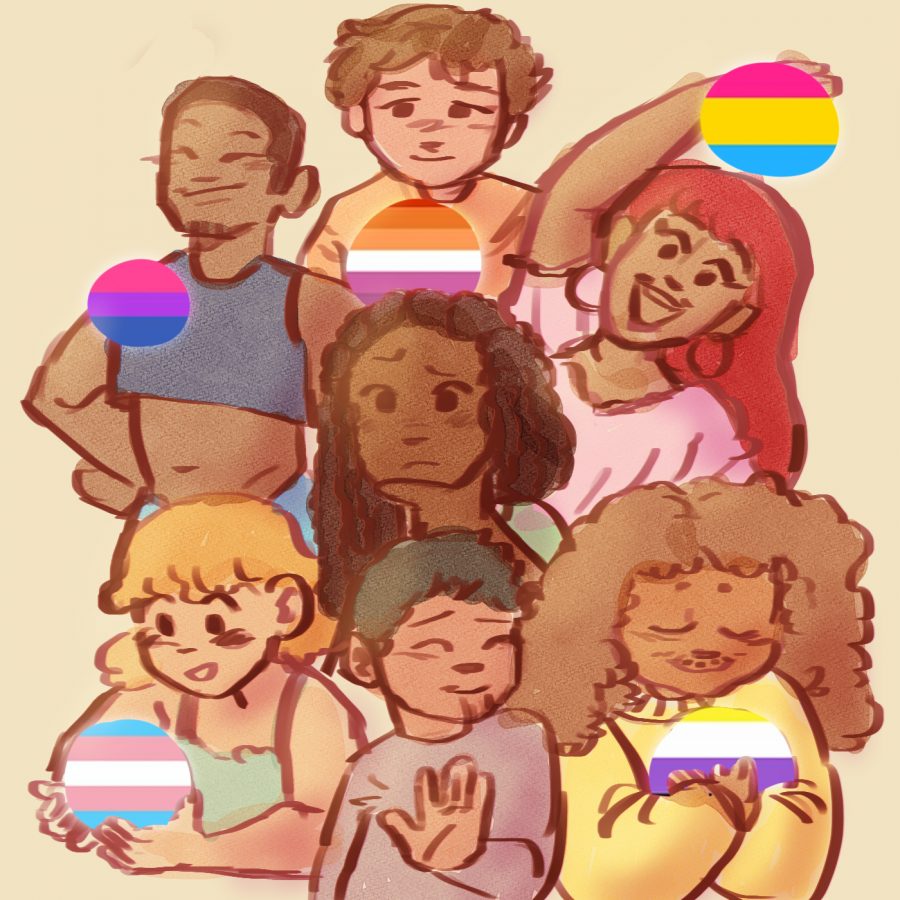LGBTQ+ students describe feelings on labels in community
July 5, 2021
Editor’s Note: This article first appeared as part of the June 28 flipbook.
Away from the nitpicking lens of those in his small town, Sam Aguilar was better able to explore their identity in their first year of college, coming out of the experience a brand-new person. Dressing in whatever feels more masculine or feminine to them, Aguilar lives by letting go of restricting labels.
“From my point of view, as I’m bisexual and nonbinary, I see that without a label, I’m free to do whatever I please,” said Aguilar, a biology sophomore. “I’m able to be more creative with what I wear and how I present myself and my character.”
With the already broad and perpetually increasing amount of labels within the LGBTQ+ community, labels are bound to affect people in different ways. Whether labels feel restricting, as people navigate their identities, or empowering, as these labels help them feel more secure, each person has their own unique way of finding their place within the community.
“I was always taught that in order to become mature, you have to set in stone your identity and just hold your character accountable,” Aguilar said. “As I’ve grown, I’ve seen that growing up as a person and finding out your identity should not come from a label; rather, it’s continuing to get to know yourself more, even if that means straying away from your personal norms.”
Growing up in a Christian household and small town, Aguilar said he had to learn to separate his religious identity with his sexual identity.
“(To me), labels are more restricting,” Aguilar said. “I’d always question myself, and I would always be in this negative place trying to figure out who I was, why I’m straying away from these labels. In reality that’s not necessarily that healthy, and you should just be open to questioning yourself and figuring yourself out.”
Also coming from a small town, public relations sophomore Faye Haynes struggled with accepting her sexuality, seeing how others from the LGBTQ+ community were treated in her school. To her, though, having the vast options of labels made the process of exploring her sexuality and sharing her identity with others easier.
“I personally like labels, and I can’t speak for the whole community, but personally, (labels) empower me,” Haynes said. “It’s helped me feel more secure in my identity.”
Though labels may feel limiting to some, others may find them helpful in coming to learn more about themselves, said Liz Elsen, director of the Gender and Sexuality Center.
“Some students find that labels never sit right with who they are, or how they experience gender and/or sexual orientation. Some people feel a sense of relief and community when they find a label that fits or works for them,” Elsen said. “Labels can feel restrictive, but they can also help people connect.”
Importantly, those labels should be chosen by the person themself and not placed upon by others. Elsen said people placing labels on others can set unwanted expectations.
“Labels that students choose for themselves can be very powerful,” Elsen said. “When other people choose labels for you, it can be harmful and limiting if it doesn’t resonate with who you are and your identity. Everyone deserves to come into themselves at their own pace, with support and community.”



